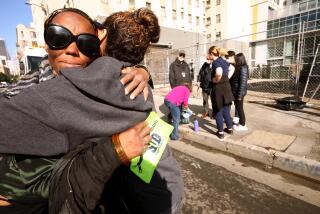Joyce: Celebrity of Homeless Dispute in N. Y.
NEW YORK â At first glance, Joyce Brown seemed to be an unlikely celebrity.
Until recently, the 40-year-old homeless woman had been living on the sidewalk next to a Manhattan restaurant, where she screamed at invisible enemies and swore at passers-by. On occasion, she would relieve herself on the sidewalk or in her clothes.
Brown caught Mayor Edward I. Kochâs attention several months ago, when he visited some of the more extreme cases of mentally ill people living on the cityâs streets. Her plight seemed desperate, aides said, and Koch decided to do something about the problem.
First Person Taken
The result was New Yorkâs controversial program of rounding up homeless mentally ill people and bringing them to Bellevue Hospital for psychiatric treatment, against their will, if necessary. The program began Oct. 28, and Brown, a former New Jersey secretary, was the first person taken off the streets.
âToday, we have performed a mitzvah (a Hebrew word meaning âgood deedâ),â Koch is reported to have said when the program got started.
But the fireworks were just beginning.
Brown, infuriated that she had been hauled off the streets, immediately contacted the New York Civil Liberties Union. She insisted that she was mentally competent and vowed to appeal her involuntary commitment in a court hearing at the hospital.
Psychiatrists who examined the agitated woman at Bellevue said she displayed evidence of psychosis, delusions and severe schizophrenia. But civil liberties lawyers, who had their own psychiatric specialists examine Brown, thought otherwise.
No Threat Seen
In the past, they disclosed, the woman had been taken involuntarily to city hospitals but then released because doctors concluded that she did not pose an imminent danger to herself.
âThis woman had no business being taken to Bellevue,â said Norman Siegel, who heads the civil liberties group. âShe may be eccentric and different, but she is not mentally ill. It was a violation of her constitutional rights to be taken off the streets.â
The fight over Brownâs incarceration became big news and her sullen face a familiar sight in newspapers and on TV broadcasts. In a flood of letters to local tabloids, readers were torn between the cityâs desire to provide care and Brownâs right to remain on the streets.
During the ensuing hearing, Brownâs sisters made a tearful appearance, begging acting Manhattan Supreme Court Judge Robert D. Lippman to keep her under hospital care. They said she had displayed violent and unruly behavior before leaving their home and was later known to have used cocaine and crack on the streets.
Ordered Release
In a strongly worded decision, Lippman ordered the city to release Brown, saying she seemed to be mentally competent and needed housing instead of a hospital stay. City attorneys appealed the ruling.
But, on Friday, a state appeals court overturned the lower court decision, ruling 3 to 2 that Brown may be held involuntarily. Brownâs attorneys said they would appeal this ruling also.
However the issue is finally resolved, the homeless woman has said that in the future she would like to find her own home and get off the streets.
Whether the city wins or loses, âthe fact is this woman needed help. And she got it,â said Sara Kellerman, who heads New York Cityâs mental health programs.
As for other patients who have been rounded up, Kellerman said six have appealed their commitments and been turned down by the courts. To date, 38 people have been rounded up, and city officials hope to bring in more than 500 before the program is finished.
More to Read
Sign up for Essential California
The most important California stories and recommendations in your inbox every morning.
You may occasionally receive promotional content from the Los Angeles Times.










